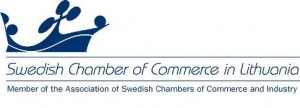VILNIUS — Lithuanian businesses aiming to export products or services in Sweden face an uphill battle according to the head of the Swedish Chamber of Commerce in Lithuania (SCCL) because of the stigma attached to the business cultures of post-Soviet countries.
“There is an uphill battle because there is a perception that people cannot trust those in Lithuania and former Soviet Union. Can we trust deliveries? If we order something, will it come on time? We are cautious,” SCCL Chairman Carl Berneheim said at a seminar called Business Development in Sweden: Goods and Exports at the Ministry of Economy Tuesday.
Berneheim said, however, that meticulous work would help dispel such beliefs about Lithuania and along with other businesspeople at the seminar asserted that having personal business relationships would help Lithuanian companies overcome cultural differences and stigmatic problems.
Ingmar Ingstad, Lithuanian honorary consulate general in Sweden, said Lithuanians should mind communication problems that can sabotage otherwise sound business deals.
“Often there are three things that hinder business ties being made with Swedes. How people make contacts, how contracts work and how we use direct and indirect language and body language,” he said.
Tomas Astrauskas, sales director for Hrono Fasadai, has experience working in Sweden and said that Swedes take a long time to trust new business partners.
“Swedes are very cautious choosing subcontractors so we are very thorough. It is hard to please clients, so we need to do a lot of work achieve first contact,” he said.
The Lithuanian economy has suffered during the crisis with large drops in manufactured exports. Sigitas Brazinskas, Lithuania’s commercial attaché to Sweden said that Lithuania could look to Sweden as a way to recover from the crisis.
“Sweden has many unexplored sectors and many opportunities. Lithuania has seen a significant drop is exports, especially compared to Latvia and Estonia. Timber products, machinery, mineral products, leather and fur have all gone down 2008 to 2009,” Brazinskas said.
Lithuania’s skilled workforce could find work with Swedes, he said.
“Sectors related to food have grown 100 percent and plastics is also growing. Opportunities there are in the high tech and automotive sectors. Testing new cars in winter, business processes, logistics.”
Brazinskas cautioned Lithuanian businessmen to make sure they are ready before trying to enter the market across the Baltic sea.
“We sometimes excessively associate ourselves with Scandinavian biz culture, but we would need to apply technological things before we could do this. We have failed to adapt,” he said adding that learning basic things like the use of technology and a strong command of English are essential.
Lithuania’s economy has been in steep decline throughout the year. One of the primary causes is the drop in demand in Lithuania’s manufacturing sector export and internal markets.













